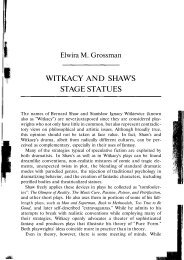printer friendly version (pdf) - University of Glasgow
printer friendly version (pdf) - University of Glasgow
printer friendly version (pdf) - University of Glasgow
You also want an ePaper? Increase the reach of your titles
YUMPU automatically turns print PDFs into web optimized ePapers that Google loves.
emained discernible well into the nineteenthcentury. In William Wordsworth’s pastoralpoem ‘Michael’, the South wind is described asmaking ‘subterraneous music, like the noise /Of bagpipers on distant Highland hills’. 17 Thesound-quality <strong>of</strong> the rumble <strong>of</strong> distant Highlandbagpipes in the background, especially itsmenacing implications <strong>of</strong> battle and upheaval,is compared with the stormy threat <strong>of</strong> a southwind, the warmth <strong>of</strong> which proverbially bringstempest. The sound <strong>of</strong> the bagpipe is threateningand disquieting; it feels like somethingunavoidable, irrepressible; almost sublime.The icon-bagpipe is so heavily charged that itis not merely pastoral and rustic. It is a disturbingpresence, which reminds the readerthat even the rural haven <strong>of</strong> the Northumbriancountryside <strong>of</strong> the poem is not free from melancholy,disquietude, and mortality.In Childe Harold’s Pilgrimage Lord Byronwrote about the battle <strong>of</strong> Quatre Bras (1815),and how the ‘pibroch thrills, / Savage andshrill’ sounded ‘in the noon <strong>of</strong> Night’, instilling‘The stirring Memory <strong>of</strong> a thousand years,/ And Evan’s – Donald’s fame rings in eachClansman’s ears!’ 18 ‘Evan’ and his successor‘Donald’ are the Camerons <strong>of</strong> Lochiel: Evanfought in the 1715 rebellion, and Donald followedPrince Charles to France after Culloden.The Jacobite rebellions are ever-present inthe author’s mind.The same battle was described by WilliamMakepeace Thackeray in Vanity Fair: the ‘shrillpipes <strong>of</strong> the Scotch’ 19 awakened Brussels, andJos Sedley snoozed ‘in spite <strong>of</strong> all the drums,bugles, and bagpipes <strong>of</strong> the British Army’. 20 Inthe latter instance we can see how the bagpipesare now quite comfortably termed ‘<strong>of</strong>the British Army’ (my italics) – they are nolonger the ‘bagpipes <strong>of</strong> the Whore’. Instead,they are the instrument which marks theproud presence <strong>of</strong> the British Army in battle.The sound <strong>of</strong> the bagpipe enshrines ideas<strong>of</strong> a long-lost past <strong>of</strong> war, conflict, rebellionagainst the Establishment. But as these laterpassages illustrate, the derogatory termshave subsided to make room for a kind <strong>of</strong>discourse which tickles the reader’s imaginationwith the memory <strong>of</strong> Jacobitism, butwhich is altogether free from its burdensomehistoricity. Jacobitism is part <strong>of</strong> a dangerouspast which is no more: it is a concept, whichspeaks <strong>of</strong> loyalty to a lost cause, attachmentto ancient values and traditions, and martialvalour. It has become a world sufficiently distantto be re-evoked, re-shaped and revisitedin an exotic form <strong>of</strong> novel-like imagination.The sound <strong>of</strong> the bagpipe can now safely belistened to and enjoyed, precisely for theideals and values it has come to embody.Many thanks to Hugh Cheape for hissuggestions.Vivien WilliamsEnglish Literature Department<strong>University</strong> <strong>of</strong> <strong>Glasgow</strong>Notes1 Grove’s Dictionary <strong>of</strong> Music and Musicians, ed. EricBlom, George Grove and Denis Stevens (New York: St.Martin’s Press, 2001), s.v. “Staggins, Nicholas”.2 Thomas Brown, ‘Letters from the dead to the living,and from the Living to the Dead, both Serious andComical’, in The Works <strong>of</strong> Thomas Brown, fifth edition(London: Printed for Sam Briscoe, 1719), vol. 2,p. 298.3 Brown, The Works <strong>of</strong> Thomas Brown, p. 300.4 Howard William Troyer, Ned Ward <strong>of</strong> Grub Street(London: Frank and Cass Company Limited, 1968),pp. 3–5.5 Edward Ward, Nuptial Dialogues and Debates: or, anUseful Prospect <strong>of</strong> the Felicities and Discomforts <strong>of</strong>a Married Life, in two volumes (London: printed forC. Hitch et al., 1759) vol. 2, p. 199.6 Smithfield is a locality in London, where cattle andother livestock were sold. The Oxford English Dictionary,prepared by John A. Simpson and Edmund S. C.Weiner (Oxford: Clarendon Press, 1991), s.v. “Smithfield”.7 Ward, Nuptial Dialogues, vol. 2, pp. 202–04.8 Ward, Nuptial Dialogues, vol. 2, p. 204.9 See Matthew John Caldwell Hogart, The Faber Book <strong>of</strong>Ballads (London: Faber & Faber, 1965), pp. 216–17.10 Ward, Nuptial Dialogues, vol. 2, pp. 206–07.11 O.E.D., s.v. “kist”.12 Ge<strong>of</strong>frey Cox, Organ Music in Restoration England(New York: Garland, 1989), vol. 1, pp. 16–17.13 The London Magazine, or Gentleman’s monthly Intelligencer,vol. XLIV (London: Printed for R. Baldwin, February1775), p. 56.14 BM 5228.15 The Poems and Songs <strong>of</strong> Robert Burns, ed. AndrewLang (London: Methuen & Co. Ltd., 1926), p. 441.16 Francis Grose, A Classical Dictionary <strong>of</strong> the Vulgar Tongue(London: Printed for S. Hooper, 1785), s.v. ‘bagpipe,to bagpipe’.17 Wordsworth Poetical Works, ed. Thomas Hutchinson(London: Oxford <strong>University</strong> Press, 1971), p. 104.18 The Complete Poetical Works <strong>of</strong> Byron, ed. Paul ElmerMore (Boston: Houghton Mifflin Company, 1933),p. 39.19 William Makepeace Thackeray, Vanity Fair (London:Oxford <strong>University</strong> Press, 186?), p. 360.20 Thackeray, Vanity Fair, p. 370.ASLSASLS is a registered charity no. SC006535ASLS is supported by Creative Scotlandwww.thebottleimp.org.ukThe Bottle Imp is the ezine <strong>of</strong> the Scottish Writing Exhibition www.scottishwriting.org.ukand is published by the Association for Scottish Literary Studies www.asls.org.uk 4


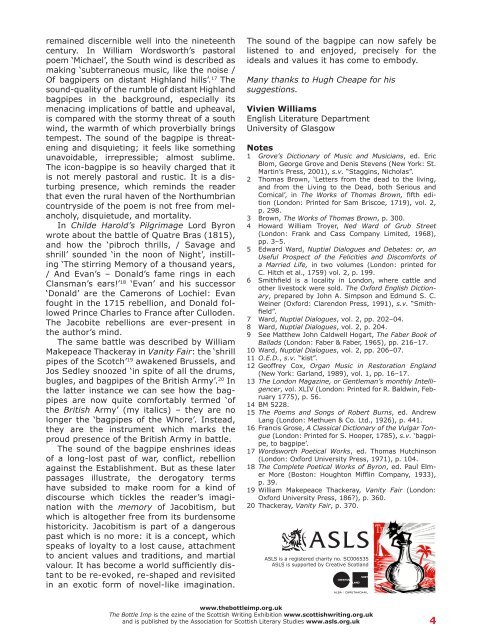
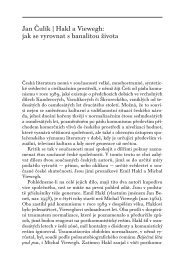

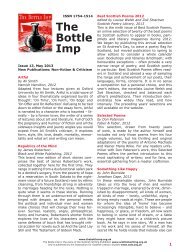
![IPA Index 1 People - E © M K C MacMahon 2007 E, [ ]: 1900.févr ...](https://img.yumpu.com/46502562/1/190x245/ipa-index-1-people-e-ac-m-k-c-macmahon-2007-e-1900facvr-.jpg?quality=85)

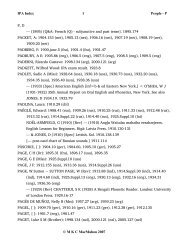
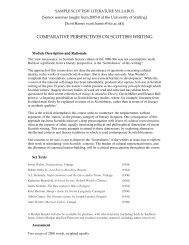
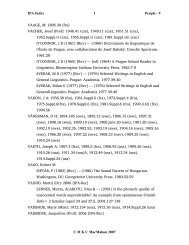
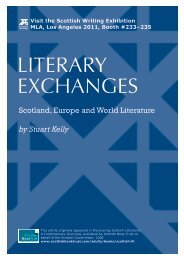
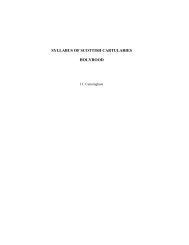
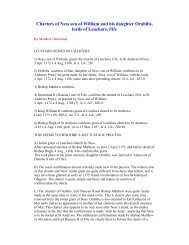

![IPA Index 1 People - D © M K C MacMahon 2007 D, [ ]: 1900.févr ...](https://img.yumpu.com/9908389/1/190x245/ipa-index-1-people-d-c-m-k-c-macmahon-2007-d-1900fevr-.jpg?quality=85)
